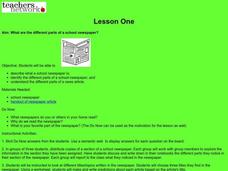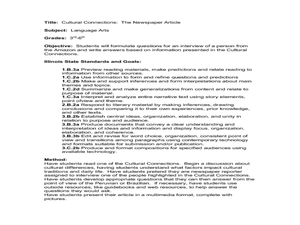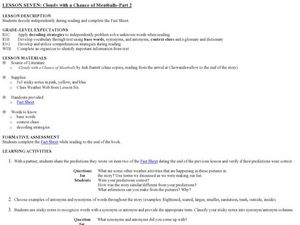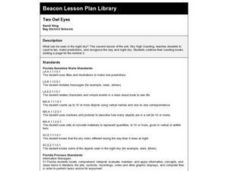Curated OER
Frankenstein Anticipation Guide
Before your high schoolers embark on the journey of Mary Shelley's Frankenstein, provide them with this prereading activity. Independently, they respond to seven statements that connect with the novel. For example, they must decide if...
Curated OER
Groundhog Day
Don't miss this resource when Groundhog Day arrives! Youngsters read the book Groundhog Day by Gail Gibbons and practice reading comprehension skills, and then choose from a series of engaging, cross-curricular activities to help...
Curated OER
High and Low Tides
Students collect real world data from the Web regarding high and low tides at various locations in the United States. They find a function which models this data and make predictions on tide levels based on the information found.
Curated OER
Treasure Hunt
Students find lost "treasure" using a treasure map after being shown a map that you have created where terms and symbols are discussed. The class is divided into small groups where they locate your treasure and then read a section from...
Curated OER
You Can't Judge a Book by Its Cover
In this You Can't Judge a Book by Its Cover activity, students answer 6 questions about a book they read. An example question includes, "How correct were your predictions about the characters?"
Curated OER
THE KING AND QUEEN OF ENGLAND
Second graders compare the parliamentary and democratic government in an attentive discussion, make realistic predictions for the story read aloud, use realistic examples in their stories about their life as a king or queen, and...
Curated OER
From Seeds to Plants
Second graders review the process of plant reproduction and the role of seeds in that process. The students dissect a seed, analyze their finds, collect and record data, and make predictions about seed germination and plant growth.
Curated OER
School Newspaper
Students analyze the different parts of a school newspaper. In this newspaper lesson, students complete a semantic web activity for newspapers and explore a newspaper in groups. Students create a write a report for the information....
Savvas Learning
Verbs: Future
As part of their study of future tense verbs, language learners engage in activities, read fables, and sing songs. The 25-page packet includes detailed lessons, worksheets, graphic organizers, and answer keys for assessments.
Curated OER
The Newspaper Article
Have your class participate in an interview activity using an informational text about the Amazon. After reading a Cultural Connections story about a person from the Amazon, middle schoolers write interview questions based on the text....
Curated OER
Using a Thermometer
First graders use their senses to formulate questions and make predictions to determine what is in the "Wonder Bag". They hold pieces of ice and examine while listing descriptors on a chart and then take their own temperature using an...
Curated OER
Looking Back, Up and Ahead
Students explore how scientists have forecasted the 2002 Leonid meteor shower. They pose their own predictions for peak meteor rates per hour during the 2002 shower and compare their results with actual observed rates.
Curated OER
The End?
This lesson asks young readers to predict what will happen to Harry Potter. While the question has been answered by the last book and film in the series, the concept and links provided by The New York Times’ Learning Network are...
Curated OER
Mississippi Trial, 1955: Anticipation Guide
As an introductory activity to Mississippi Trial, 1955, class members use color-coded dots to respond anonymously to a series of statements about prejudice and responsibility to their fellow-man that are posted about the room. The...
Curated OER
Blending with Frog and Toad
Students apply word analysis and vocabulary skills to comprehend selections by reading and interpreting a variety of literary words. They then make predictions about the story and identify blends within the English language.
Curated OER
You Can Bank on It
Pupils analyze the impact of the J.P. Morgan/Chase Manhattan merger, and predict how the merger affect the company's financial performance. They create annual reports for the company based on their predictions.
Curated OER
Wagons West
Fourth graders demonstrate knowledge of the size of a wagon by making several different predictions. They develop a list of items that pioneers would need while traveling on a wagon train.
Curated OER
Physical Science: Magnets
Students investigate magnets and how they work. They read and discuss the book, What Makes a Magnet and record their observations as they complete activities. After exploring the magnet set, they record their predictions and results...
Curated OER
Total English Advanced: What Does the Future Hold?
In this future probability practice activity, students interview 3 other students regarding predictions for the future and then create a written summary of the predictions.
Curated OER
Cloudy with a Chance of Meatballs - Part 2
Learners recognize synonyms and antonyms. In this reading strategies instructional activity, students use the book Cloudy with a Chance of Meatballs by Judi Barrett to make predictions, and correctly recognize synonyms and antonyms.
Curated OER
Air Pressure and Wind
Fourth graders explore weather by reading weather measurement text. In this barometer lesson, 4th graders discuss ways weather is measured on Earth and how these measurements lead to predictions. Students read assigned text, discuss...
Curated OER
The Lorax and Forest Park
Students read The Lorax by Dr. Seuss and identify situations where there is a risk to the community. During a class discussion, students predict types of liter they will find in a park. Students take a field trip to the park to collect...
Curated OER
Past and Present Tense
Students make predictions about the coming up chapter in their book. Students are introduced to new vocabulary words and definition for this new chapter. Students create a table where they can input the new vocabulary word, definition...
Curated OER
Two Owl Eyes
First graders listen to the story, Olivia Counts, and demonstrate counting to ten. They make predictions, and recognize the day and night sky. They add page number 2 to their counting books.

























